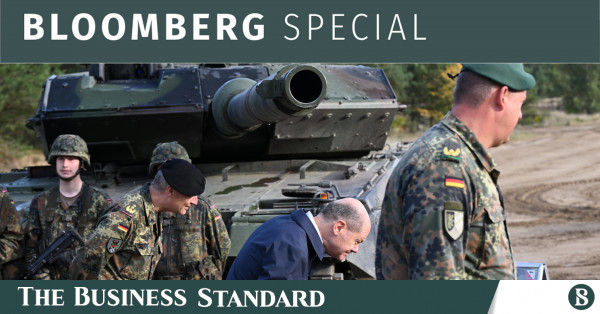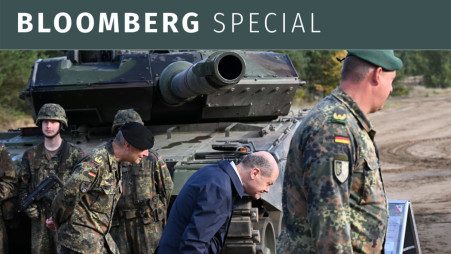
It’s good that Chancellor Olaf Scholz is finally giving Ukraine tanks. Now let’s admit what it took to get there
Good at ducking.Photographer: David Hecker/Getty Images
“>

Good at ducking.Photographer: David Hecker/Getty Images
German Chancellor Olaf Scholz was busy this week selling his much-delayed nod for Western deliveries to Ukraine of German-made battle tanks as a case study in prudent leadership. It was certainly a welcome step forward in helping Ukraine defeat the Russian invaders. But the long and fraught negotiations among NATO allies leading up to this breakthrough offer another, more sobering, conclusion for the European Union — and about Germany’s role in it.
It’s that today and for the foreseeable future, just as during the Cold War, Europe remains entirely dependent on the US for its security. The flip side of this reality is that highfalutin’ notions by the likes of French President Emmanuel Macron about European “autonomy” remain pipe dreams, and therefore distractions best discarded in diplomats’ trash cans.
The backstory that allowed Scholz to “free the Leopards” — that is, to allow shipments of German-made Leopard 2 tanks to Ukraine — is one of transatlantic tension and frustration. The eastern NATO and EU members — Poland and the Baltic states — have been pushing for these deliveries since last summer. The US in recent months has chimed in. But the Germans, until this week, balked.
The reason was that Scholz feared not only that the war in Ukraine might metastasize into a conflict between Russia and NATO — nobody wants that — but specifically that Germany might find itself in the crosshairs of Russian President Vladimir Putin. Delivering Leopard 2s, Scholz worried, might provoke him to escalate.
As the talks progressed and became more urgent — with a “maneuver war” expected to start in the spring — Scholz therefore clarified his condition. Germany would agree to sending Leopards only if the Americans also sent their battle tanks, the M1 Abrams.
From a military point of view, shipping Abrams tanks doesn’t make as much sense. They’re probably the most complex tanks around and require not only the longest training but also the most elaborate supply chains for their specialized fuels and parts. Ukraine needs tanks that are state-of-the-art but also nimbler and easier to learn, as well as faster to ship and deploy. Leopards fit that description best. So the Americans initially said no.
Understanding the conundrum, the other allies tried to get Scholz to move even without Abrams in tow. The populist government of Poland, which is waging an election campaign based largely on anti-German rhetoric, publicly pressured and embarrassed Germany, even threatening last week to send some of its own Leopard 2s to Ukraine without Berlin’s permission. The Brits took a more subtle approach, pledging 14 of their own Challenger 2 tanks, reckoning that going first might give Scholz enough cover.
None of this sufficed to sway the chancellor. The Poles merely irked him, as he hinted in addressing the Bundestag this week. And the UK — sorry, Brits — evidently didn’t strike him as a sufficiently weighty Western power to be Germany’s wing man. Scholz insisted on having the Americans onside.
US President Joe Biden understood what was at stake. This is how, for political rather than military reasons, the Americans in the past week came around, announcing that they’ll send M1 Abrams tanks after all — 31 of them, even though they may take many months to arrive on the battlefield. In private, the folks in the Pentagon and White House are annoyed by Scholz’s dithering and peskiness. In public, they’re praising his leadership in keeping the Western alliance united against Putin. And with that support, Scholz felt ready to set his big cats free.
What matters now is that the tanks actually get to Ukraine in time for the spring offensives by invaders and defenders alike. That goes for the British Challengers, the smaller Bradleys, Marders and other armored fighting vehicles already pledged, but above all for the Leopards.
In total, the Europeans — from Germany and Poland to Spain, the Netherlands, Finland and others — could pitch in about a hundred. But getting them into Ukraine will be a nightmare, because Putin will draw a bead on them all along the way. Fueling and repairing them is another story still, as is using them properly to break through the Russian lines.
One person who’s been notably quiet during this diplomatic drama is Macron. He’s hinted that France may also send some of its Leclerc tanks, but provided no more detail than that. Only last weekend, he hosted Scholz at the Sorbonne, along with hundreds of legislators from both countries, for a grand celebration of the 60th anniversary of the Elysee Treaty. That’s the accord that sealed the friendship, and allegedly the joint destiny, of France and Germany as a power couple that might one day — or so Paris long hoped — co-parent a strong Europe and wean it off American guardianship.
So much for all that. What Scholz and Biden have agreed to this week is good for Ukraine, although it must be followed by even more weapons and support. But their understanding also puts paid to all notions that Germany is any closer to becoming a “leader” within a Europe that can itself become autonomous within the Western alliance, and a geopolitical power in its own right. Perhaps it’s good that we’ve got that straight.
German Chancellor Olaf Scholz was busy this week selling his much-delayed nod for Western deliveries to Ukraine of German-made battle tanks as a case study in prudent leadership. It was certainly a welcome step forward in helping Ukraine defeat the Russian invaders. But the long and fraught negotiations among NATO allies leading up to this breakthrough offer another, more sobering, conclusion for the European Union — and about Germany’s role in it.
It’s that today and for the foreseeable future, just as during the Cold War, Europe remains entirely dependent on the US for its security. The flip side of this reality is that highfalutin’ notions by the likes of French President Emmanuel Macron about European “autonomy” remain pipe dreams, and therefore distractions best discarded in diplomats’ trash cans.
Andreas Kluth is a Bloomberg Opinion columnist covering European politics. A former editor in chief of Handelsblatt Global and a writer for the Economist, he is author of “Hannibal and Me.” @andreaskluth
Disclaimer: This article first appeared on Bloomberg, and is published by special syndication arrangement.






